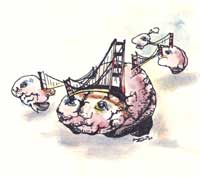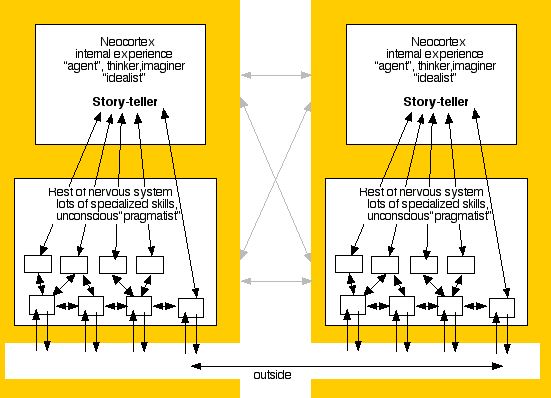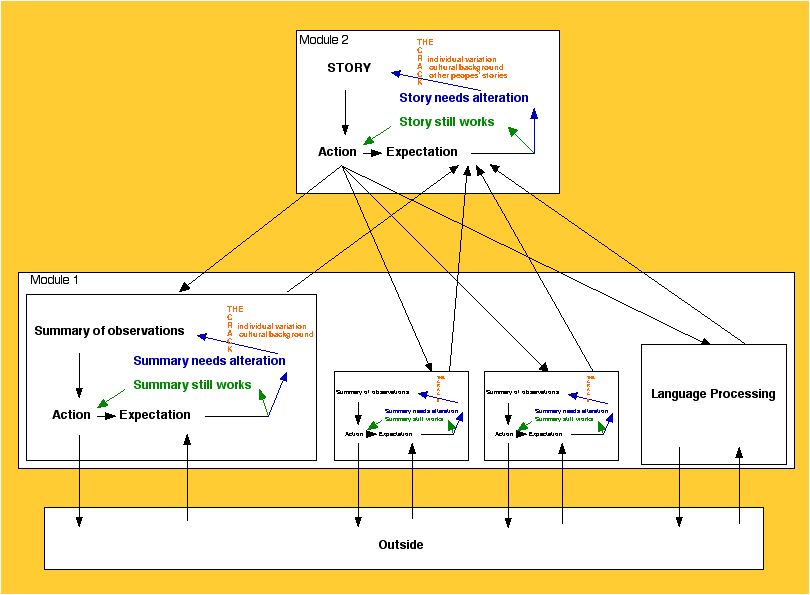
BRAIN AND BEHAVIOR INSTITUTE 2006
Session 17


| BRAIN AND BEHAVIOR INSTITUTE 2006 | 
|
|
Review: Science/understanding advances by "getting it less wrong", by noticing and correcting discrepancies between expectation and input. The human brain has three such loops
| 
|
A Closer Look at the Conscious/Unconscious Loop: Self-responsibility, self-development

| "free will" is not the capacity to do whatever one wants; it is the capacity to play a causal role in shaping oneself and so depends on self-reflection, ie knowing as best one can who one is (having a good story) and being able to imagine a less wrong self ... |
To help all involved to become better inquirers, to enhance every individual's capability to evolve, and to influence their own evolution. Science and science education has a special role to play in this, by sharing the perspectives and skills of getting it less wrong, of not only making sense of the world but conceiving new ways to make sense of oneself and the place of oneself and others in the world.
| We are a human community, and among our greatest strengths is the differences among us. They are to be feared only when they are accompanied by estrangement. We need to hear each others' stories, so that we can better tell and retell our own and, in doing, contribute our own pieces to the continually evolving human story. And we need not only to feel but also to reflect and think, to find the new and still better ways to make sense of the world we find ourselves in ... and to remake it anew ... There is no way to guarantee well-being, safety, security, happiness. But we can get less wrong, learn from the past, not remake mistakes by which humans themselves worsen rather than lessen human vulnerability. It is a time to take the time to feel and reflect and think, to tell and listen to each others' stories, to commit ourselves anew to finding ways to tell our collective human story in a way from which no one feels estranged. ... 11 September 2001 |
Your classrooms (and mine)
|
"the brain is wider than the sky ..." "why lecture?" "coming out of the box" "who is Bertie Wood?" "Presenting science as a" story " as opposed of absolute "truth" is liberating" "if there is no way to control the system by controlling the input, then what is the function of a teacher?" "I will now think of my classroom as a collection of central pattern generators" "who's using behavioral modification on whom?" "reality is subjective" "The idea that there is an outside world to impress our thoughts upon gives all the inner activity of the brain i.e. thinking, a sense of purpose." "discrepant events" "I-function" "teachers are actors" "teachers need to be not only brain surgeons but also therapists" "enlightenment comes when enlightenment comes" "I can't believe when I relaxed and stopped worrying about getting it right I was able to start my web site" "is this a good story"? |
Science isn't about truth, its about skepticism Science isn't about content but about process Progress depends on being wrong The brain can generate outputs without inputs What we see always reflects processes that we don't know about The unconscious is better at some tasks than the conscious Unconscious/conscious conflicts are an important source of getting it less wrong Conflicts between humans are an important source of getting it less wrong "Disability" is always a culture dependent concept "Human nature" is itself alterable |
| teacher | students | ||||||||||||
|---|---|---|---|---|---|---|---|---|---|---|---|---|---|
| you are a unique and valuable individual | they are unique and valuable individuals | ||||||||||||
| you know more than you think you do | they know more than they (and you) think they do| you are equipped to learn, to get it less wrong, and want to | they are equipped to learn, to get it less wrong, and want to
| education is exploration | education is exploration | you need a classroom rich enough to explore | they need a classroom rich enough to explore
| we're all in this together | we're all in this together
| together we can get it "less wrong" | together we can get it "less wrong"
| and have fun | and have fun | |
Trust your past (including your genome/culture/experiences), but not too much
Trust your unconscious, but not too much
Trust your thinking, but not too much
Trust making choices, observing, learning, but not too much
Trust other people's stories as well as your own, but not too much
Keep looping ...
And repeat, over and over and over again:
Out beyond ideas of right-doing and wrong-doing |